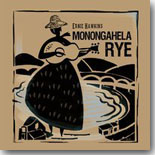 Guitarist Ernie
Hawkins is one of the last of the Reverend Gary
Davis disciples who studied with the legendary
plectorist and took what he learned a step or two
further. Blending originals with classic tunes from
Blind Blake, James P. Johnson, Hoagy Carmichael and
Gary Davis on Monongahela Rye (Corona),
Hawkins dazzles with finger picking and delightful
vocals.
Guitarist Ernie
Hawkins is one of the last of the Reverend Gary
Davis disciples who studied with the legendary
plectorist and took what he learned a step or two
further. Blending originals with classic tunes from
Blind Blake, James P. Johnson, Hoagy Carmichael and
Gary Davis on Monongahela Rye (Corona),
Hawkins dazzles with finger picking and delightful
vocals.
On the original title
piece he sings of the joys of rye whiskey: “Come on
boys/let’s get a little high/You me and Sal/and that
Monongahela Rye/Down on the river/playing some
blues/Glad we got that Monongahela booze.” Some song
greats are solo affairs, such as Blind Blake’s "Too
Tight" on which he dazzles with his picking on the
classic rag. On others he employs Paul Consentino’s
clarinet, Joe Dallas’ trombone, Roger Day’s tuba,
Marc Reisman on harmonica and Jim Barr’s keyboards
to wonderful effect.
"Monongahela River
Waltz" shows the magic of all of the instruments
collaborating, trombone accents "Hesitation Blues,"
clarinet and trombone interplay on "Sweethearts On
Parade" and the clarinet and percussion from
producer George Heid highlight the gorgeous
"Carolina Shout." "Red, Red Robin," a hit from the
depression era is jaunty and foot tappingly fun in a
somber sort of way.
Instrumentals, such
as Jelly Roll Morton’s "Catfish" and Big Bill
Broonzy’s "Stovepipe Stomp" are wholly impressive.
Ernie Hawkins is one of the giants of classic
acoustic blues. This is the maestro at his best.
---
Mark E. Gallo
 Eliza Neals is
a balls-to-the-wall rocker when it strikes her. It
strikes her often on the impressive explosive debut,
Breaking and Entering (self-produced). Paired
with the dynamic guitar work of Howard Glazer, with
guest spots from Kid Rock’s guitar player Kenny
Olson on a pair, this has Detroit written all over
it.
Eliza Neals is
a balls-to-the-wall rocker when it strikes her. It
strikes her often on the impressive explosive debut,
Breaking and Entering (self-produced). Paired
with the dynamic guitar work of Howard Glazer, with
guest spots from Kid Rock’s guitar player Kenny
Olson on a pair, this has Detroit written all over
it.
The opener, "Detroit
Drive," is a stunner, with just Neals and Glazer’s
dobro. The combination is flawless. Neals is
reminiscent here of Fiona Boyes, full of a low
growly inflection. The title cut has that killer
'Rock Me Baby' groove. She says there “ain’t no need
to call the cops” because she’s “gonna make your
heart stop.” You know this is a dangerous lady.
Glazer’ licks are fiery and inventive. For those of
you who remember Maggie Bell from the 1970s, it’s a
good point of reference.
Kenny Olson sits in
and takes it to the stratosphere for Eliza’s
repetitive and powerfully gentle line on "You"– “you
make me come alive.” Gabe Gonzales, drummer with
George Clinton, and co-producer Mike Puwal’s bass
punctuate this jammer. "Pretty Gritty" is a
percussive ode to the dark side of the party life
(“Where you gonna run/where you gonna hide/when the
jig is up/baby and you’re on your behind?”).
"Southern Comfort,"
with Olson on guitar, is a love song that has
nothing to do with whiskey. On the other hand,
"Spinning" is a glimpse into that horrible drunk
that comes when you know it was too much and the
room won’t stop spinning ("Lord help me/I can’t find
my way home/bed is spinning/I’m on the ground…”)
This a vocal and guitar conversation, accentuated by
hand claps.
"Windshield Wipers"
is the most lyrically powerful tune on the set. Much
more than the cliché leaving song, and accentuated
brilliantly by Gonzales’ sparse drumming and
Glazer’s slinky guitar lines, Neals sings, “Thinking
of the day when he broke my heart/It was on a rainy
day/walked into the house and heard him moaning/knew
I couldn’t stay/I went upstairs I busted down the
door/man you should have seen his face … on my way
out the house/I smashed everything I saw in that
place/TV set, the radio/even pulled the fridge down
to the floor … listen to the sound of the windshield
wiper wiping my tears away…listen to the sound of
the lonely highway calling my name.”
Barrett Strong’s
"Sugar Daddy," the only non-Neals number here, has a
playful dance floor groove. On the following "I’m
the Girl," she sings that she’s “the girl with the
pretty pretty smile/I’m the girl who’s good at
running wild.”
From the first listen this just grows
more and more impressive. Great job, Eliza!
--- Mark E. Gallo
 Father’s Day is
Ronnie Earl’s ninth release for
Stony Plain Records, but it’s a bit different from
his last few albums. This time around, 2014 Blues
Foundation Blues Guitarist of the Year features a
pair of guest vocalists, Diane Blue and Michael
Ledbetter of the Nick Moss Band, on 12 of the
album’s 13 tracks. He also utilizes a full
horn section for the first time in many years. Of
course, Earl continues to be backed by The
Broadcasters (Lorne Entress – drums, Dave Limina –
keyboards, and Jim Mouradian – bass), his band for
over a quarter century and one of the finest
currently practicing.
Father’s Day is
Ronnie Earl’s ninth release for
Stony Plain Records, but it’s a bit different from
his last few albums. This time around, 2014 Blues
Foundation Blues Guitarist of the Year features a
pair of guest vocalists, Diane Blue and Michael
Ledbetter of the Nick Moss Band, on 12 of the
album’s 13 tracks. He also utilizes a full
horn section for the first time in many years. Of
course, Earl continues to be backed by The
Broadcasters (Lorne Entress – drums, Dave Limina –
keyboards, and Jim Mouradian – bass), his band for
over a quarter century and one of the finest
currently practicing.
The 13 tracks are mostly covers, a pair of
Otis Rush tunes (“It Takes Time” and “Right Place
Wrong Time”), two by Magic Sam (“What Have I Done
Wrong” and “All Your Love”), plus songs from B.B.
King (“I Need You So Bad”), Van McCoy (“Giving Up”),
Fats Domino (“Every Night About This Time”), Brook
Benton/Bobby Bland (“I’ll Take Care of You”), and
Thomas A. Dorsey (“Precious Lord”). The lone
instrumental is also a cover, a bluesy take on Bobby
Timmon’s “Moanin’.” Earl also offers three
originals, a remake of one of his earlier standouts,
“Follow Your Heart,” and two fine new tunes (“Higher
Love” and the title track).
What’s cool about Father’s Day is that the added
vocal tracks don’t mean that there’s less of
anything else. There’s plenty of room for Ms. Blue
and Mr. Ledbetter to do their thing (and they do
their thing extremely well), but the enterprising
Mr. Earl also gets ample room to weave his
six-string magic, dazzling with his always creative
and adventurous fretwork. He plays with so much
intensity (and so much soul) that the guitar almost
seems to possess lifelike qualities.
The West Side numbers from Rush and Magic Sam, plus
the Fats Domino and B.B. King tracks (both covered
by Magic Sam during his short career), are keepers,
though on the latter tune Earl gives a nod to both
guitarists with his extended solos. The nine-minute
cover of “I’ll Take Care of You” is an exquisite
slow blues that will actually disappoint listeners
when it ends, and “Moanin’” fuses soul, blues, jazz
together as effectively as can be done, and Earl’s
subdued version of “Precious Lord” closes the album
beautifully.
Earl dedicates Father’s Day, the album and the song,
to his late father, a Holocaust survivor (as was
Earl’s mother) whose picture is included in the CD
package. Earl says in the dedication that he and his
father “came to peace in the end,” before his death
in 2014. Love and forgiveness is a recurring theme
with this album, and it really seems like Ronnie
Earl is in a perfect place, both musically and
spiritually. Father’s Day contains some of the best
and most inspired guitar work of his five-decade
career.
---
Graham Clarke
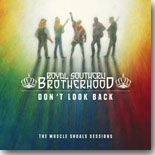 For their third studio album,
Royal Southern
Brotherhood travelled to upper Alabama, to the
legendary FAME Studios, home of classic ’60s
recordings from Aretha Franklin, Wilson Pickett,
Otis Redding, Etta James, and many others, in Muscle
Shoals. Two of RSB’s founding members, guitarists
Devon Allman and Mike Zito, didn’t make the trip,
having left the group to focus on their solo
careers, but singer/percussionist Cyril Neville, and
the tight rhythm team of bassist Charlie Wooton and
drummer Yonrico Scott remain firmly entrenched and
focused on carrying on the group’s signature mix of
Southern blues & rock and New Orleans soul & funk.
For their third studio album,
Royal Southern
Brotherhood travelled to upper Alabama, to the
legendary FAME Studios, home of classic ’60s
recordings from Aretha Franklin, Wilson Pickett,
Otis Redding, Etta James, and many others, in Muscle
Shoals. Two of RSB’s founding members, guitarists
Devon Allman and Mike Zito, didn’t make the trip,
having left the group to focus on their solo
careers, but singer/percussionist Cyril Neville, and
the tight rhythm team of bassist Charlie Wooton and
drummer Yonrico Scott remain firmly entrenched and
focused on carrying on the group’s signature mix of
Southern blues & rock and New Orleans soul & funk.
The new RSB line-up is in place for
Don’t Look Back:
The Muscle Shoals Sessions (Ruf Records).
Nashville-based guitarist Bart Walker (winner of the
2012 IBC’s Best Guitarist Award) and guitarist
Tyrone Vaughan (son of Jimmie Vaughan) now fill the
guitar positions, and they bring an even funkier
approach to the proceedings with their fretwork
while leaving the group’s blues-rock leanings intact
(thanks in part to the production of Tom Hambridge,
who’s surely one of the busiest men on the planet)
on these 14 terrific original tracks.
Walker makes his presence known pretty quickly on the
opening track, the crunching rocker “I Wanna Be
Free.” A powerful vocalist, he shares the lead with
Neville and combines with Vaughan to deliver a
potent guitar attack. The pair combine for some
impressive guitar work on other tracks like “Come
Hell or High Water” and “Hard Blues.” On the funky
title track, he plays banjo and sings.
Speaking of funk, there’s plenty available with
Neville leaving his mark on tunes like “Hit Me
Once,” “Big Greasy,” “Reach My Goal,” and the
sensational horn-driven “They Don’t Make ‘em Like
You No More.” Neville offers up plenty of solid
soul, too, on tracks like “Better Half, “It’s Time
For Love,” and the lovely “Anchor Me,” co-written by
Neville and Anders Osborne. Vaughan steps behind the
mic himself on the soulful blues, “Poor Boy.” “Bayou
Baby” is a swampy blues rocker with vocals from
Neville backed by harmonica and vocals from former
Wet Willie frontman Jimmy Hall.
Although I was a fan of the original incarnation of
Royal Southern Brotherhood, I think this edition is
even more potent. They bring the funkier side of the
music more to the forefront, which is a great thing
when you have Cyril Neville in the band. With the
rock-solid rhythm section and a great pair of young
guitarists in Walker and Vaughan, great things could
be ahead. Don’t Look Back continues RSB’s upward
momentum.
---
Graham Clarke
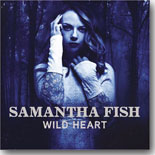 For Wild Heart (Ruf Records), the third studio
release from Samantha Fish, the Kansas City-based
singer/guitarist most definitely did not rest on her
laurels following the accolades received for her
previous two albums. Instead, she raised the bar
considerably by collaborating with famed songwriter
Jim McCormick, who’s penned songs for Keith Urban
and Trisha Yearwood. She also enlisted Luther
Dickinson of the North Mississippi Allstars to
produce and play guitar, and invited his fellow
Allstars, Lightnin’ Malcolm and Sharde’ Thomas, plus
Grammy-winning drummer Brady Blade, to contribute.
The result is her best album to date by a wide
margin.
For Wild Heart (Ruf Records), the third studio
release from Samantha Fish, the Kansas City-based
singer/guitarist most definitely did not rest on her
laurels following the accolades received for her
previous two albums. Instead, she raised the bar
considerably by collaborating with famed songwriter
Jim McCormick, who’s penned songs for Keith Urban
and Trisha Yearwood. She also enlisted Luther
Dickinson of the North Mississippi Allstars to
produce and play guitar, and invited his fellow
Allstars, Lightnin’ Malcolm and Sharde’ Thomas, plus
Grammy-winning drummer Brady Blade, to contribute.
The result is her best album to date by a wide
margin.
The opening track is “Road Runner,” a driving rocker
that has just a taste of Americana in it. “Place To
Fall” is a sorrowful ballad, which Fish co-wrote
with McCormick. Dickinson’s wailing lap steel guitar
blends in perfectly, given the subject matter. The
lap steel returns for the more exuberant “Blame It
On The Moon ,” another track with roots in
Americana. “Highway’s Holding Me Now” is a gritty
blues rocker which is followed by the contemplative
ballad “Go Home,” one of Fish’s best compositions on
the disc.
“Turn It Up” is an upbeat rocker that will indeed
prompt you to turn it up, which works well for the
crunching blues rocker “Show Me” that follows. The
introspective “Lost Myself” offers more reflection
and is followed by the thunderous title track and
the irresistible “Bitch On The Run.”
The album’s two covers were done at Dickinson’s
Zebra Ranch Studios in Hernando, Mississippi with Dickinson,
Malcolm, and Thomas, and they are both fantastic.
The first is Charley Patton’s “Jim Lee Blues Pt. 1,”
which features Dickinson on mandolin and Fish and
Malcolm on guitars. The other cover is Junior
Kimbrough’s “I’m In Love With You.” Fish’s vocals
really bring a new dimension to both tracks,
especially the Kimbrough tune.
All of Samantha Fish’s previous releases (her two
previous solo efforts and the Girls With Guitars
collaboration with Dani Wilde and Cassie Taylor from
2011) have shown remarkably developed talents as a
singer, guitarist and songwriter. She’s never been
afraid to branch out into other areas of the blues
and she does so with Wild Heart more than
previously, with impressive results. The best thing
is that there’s still much more to be heard from
her.
---
Graham Clarke
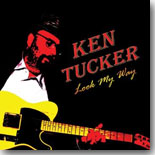 Guitarist Ken Tucker has a pretty diverse résumé,
playing not only the blues, but also venturing into
Christian rock and hip-hop over his 40-year career,
playing with Christian artist Larry Norman, Darrell
Mansfield, Lindsey Ell, and Shawn Mullins. Tucker’s
latest release, for Blues Critic Records, is Look My
Way and its nothing but the blues, mixing a hard
rocking edge with R&B and roots music.
Guitarist Ken Tucker has a pretty diverse résumé,
playing not only the blues, but also venturing into
Christian rock and hip-hop over his 40-year career,
playing with Christian artist Larry Norman, Darrell
Mansfield, Lindsey Ell, and Shawn Mullins. Tucker’s
latest release, for Blues Critic Records, is Look My
Way and its nothing but the blues, mixing a hard
rocking edge with R&B and roots music.
The disc is loaded with impressive tunes like the
roadhouse rockers “Honey Pot,” “Brother Whiskey,
Sister Nicotine,” “Simone,” “Call Me The Doctor,”
“What I Need,” and the title track. He also does a
fine job on the funky R&B of “Best Bad Habit” and
the Windy City-styled “Come Into My Parlor.”
However, he saves some of his best guitar work on
several slower blues tunes, “Street Walkin’ Woman,”
“Coal Shed Blues,” “Hello Mr. Park Bench,” and the
tender R&B ballad, “Nobody But You,” which closes
the disc.
Tucker’s guitar work is excellent, but he also wrote
all 12 of the tracks. In addition, he’s a
standout vocalist with his warm, rugged, gritty
vocal style. He gets excellent support from Virgil
Franklin, who plays bass, keys, and saxophone, and
Russell Tucker who mans the drums. Though they’re
small in number, they are big in sound.
Tucker has learned his lessons well over his lengthy
career. Look My Way is a great and savvy set of
original modern blues that will certainly satisfy
fans of hard-edged blues rock and roots music.
---
Graham Clarke
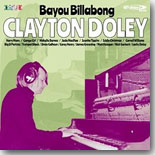 Australian Clayton Doley has been touring around the
globe over the last few years playing
keyboards/organ for Harry Manx and Eugene “Hideaway”
Bridges. He’s played with Joe Bonamassa, Walter
“Wolfman” Washington, Hubert Sumlin, and many
others. He also maintains a solo career and his
latest release, Bayou Billabong (Hi-Fi-Doley-T
Music), is an impressive effort that was recorded in
Sydney, Australia and New Orleans.
Australian Clayton Doley has been touring around the
globe over the last few years playing
keyboards/organ for Harry Manx and Eugene “Hideaway”
Bridges. He’s played with Joe Bonamassa, Walter
“Wolfman” Washington, Hubert Sumlin, and many
others. He also maintains a solo career and his
latest release, Bayou Billabong (Hi-Fi-Doley-T
Music), is an impressive effort that was recorded in
Sydney, Australia and New Orleans.
Doley wrote all eight of the songs featured on
Bayou
Billabong. He has a smooth vocal style that’s as
comfortable with pop and jazz as it is with blues
and soul. Doley shows that he’s skilled in the New
Orleans style with the opening track, “Disbelief”
and “Lose It,” which also features some Professor
Longhair-styled keyboards. “I Live For You” and
“Truly Amazing” are more on the jazz and pop side
respectively, but both work really well within the
framework of the album, and provide a showcase for
Doley’s keyboards on the former and his vocals on
both tracks.
The title track is an interesting assembly, a funky
instrumental mixing Doley’s Hammond B3 with guest
star Manx’s lap slide guitar and Digeridoo from
virtuoso Gangi Giri. “Waiting For The Coffee” has a
distinctive bluesy New Orleans feel, courtesy of the
Monster Gents, members of Jon Cleary’s group (Derwin
“Big D” Perkins – guitar, Cornell C. Williams –
bass, Eddie Christmas – drums), who serve as Doley’s
rhythm section on the album.
“We’re Still Changing” is
’70s-flavored R&B with
sweet backing vocals from the Clay-Tones (Mahalia
Barnes, Jade Macrae, Juanita Tippins), who figure
prominently throughout the disc, and the
slow-simmering funk of “Starting Right Now” closes
the disc in excellent fashion.
Also contributing are two fabulous horn sections,
the Treme Funktet – consisting of members of New
Orleans bands Galactic and Trombone Shorty’s Orleans
Avenue (Corey Henry – trombone, Travis “Trumpet
Black” Hill – trumpet, Drew Calhoun – tenor sax),
and the Hi-Fi-Doley-T Horns (James Greening –
trombone, Matt Keegan – baritone and tenor saxes,
and Nick Garrett – trumpet).
Bayou Billabong brings together talented musicians
from three different countries recording over two
continents. The result is an album that captures the
flavor of the Crescent City with an occasional mix
of influences from Doley’s native country. It shows
that while they may do things a little different
Down Under, the blues is still the blues wherever
you listen.
---
Graham Clarke
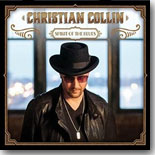 Detroit native Christian Collin was born into a
musical family --- his father was a singer/guitarist
who worked as an A&R man for Capitol Records and was
Bob Seger’s road manager. He grew up among the
sounds of Motown and classic rock & roll and
listening to musician friends who came to visit his
parents, but he really got the itch after his
parents took him to see Little Feat shortly before
Lowell George’s passing in 1979. Formerly the front
man for the acclaimed blues rock band Molasses,
Collin went solo in 2012.
Detroit native Christian Collin was born into a
musical family --- his father was a singer/guitarist
who worked as an A&R man for Capitol Records and was
Bob Seger’s road manager. He grew up among the
sounds of Motown and classic rock & roll and
listening to musician friends who came to visit his
parents, but he really got the itch after his
parents took him to see Little Feat shortly before
Lowell George’s passing in 1979. Formerly the front
man for the acclaimed blues rock band Molasses,
Collin went solo in 2012.
The singer/songwriter/guitarist’s latest release is
Spirit of the Blues (C-Train Records) and it pays
tribute to Collin’s blues heroes and influences over
his 20-plus year career. He wrote all 12
songs and they mix blues, rock & roll and soul in
equal portions. Collin is backed by his longtime
band (Alex Evans – bass, Chris Morrow – drums),
along with guest musicians Billy Branch and Matthew Skoller (harmonica), Johnny Iguana (keyboards), Pete
Galanis of Howard and the White Boys (slide guitar),
and Jen Williams (background vocals).
The opener, “One and Only,” is a tight and funky
high energy track that kicks things off in grand
style. “Player’s Game” is a rowdy blues shuffle with
harmonica from Skoller that rolls into the southern
rocker “A Woman Like You,” followed by “Dance The
Blues Away” and the smoky R&B ballad “Without You.”
The title track is a splendid slow blues that tells
about the impact and influence of the blues on
Collin’s life.
The energetic shuffle “Highway Song” pairs Collin’s
crisp guitar work with Skoller’s fiery harmonica,
and is backed by the funky blues rocker “Blues For
You.” “Dead Man Walking” is a moody lament with a
hypnotic rhythm and eerie slide guitar from Collin.
On the spirited “Old 109,” Collin and Galanis join
forces and Skoller nearly blows the back off his
harmonica. “The River (Unplugged),” an acoustic
number teaming Collin’s guitar with Branch’s
harmonica, slows things down a bit, and “Forever
Friends,” a classic soulful ballad that adds horns
(Rodney Brown – sax, Kenny Anderson – trumpet, Bill
McFarland – trombone) closes things out.
There’s a lot to like about
Spirit of the Blues.
Christian Collin honors his influences from Motown
to Chicago to Memphis to the Delta with a disc that
not only pays tribute to the past, but looks forward
to the future. It’s safe to say that the future is
in good hands.
---
Graham Clarke
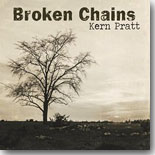 Kern Pratt was born and raised in the Mississippi
Delta. He’s played all the big festivals in
Mississippi – Mississippi Delta Blues Festival, the
Juke Joint Festival, the B.B. King Homecoming,
etc….. He’s also played at the IBC (finishing second
in 2013) and at the annual Mississippi Picnic which
takes place at Central Park in NYC every year. He’s
played with a diverse group of artists ranging from
the late Willie Foster and T-Model Ford to Eden
Brent to Percy Sledge to Hamilton, Joe Frank &
Reynolds to Steve Azar.
Kern Pratt was born and raised in the Mississippi
Delta. He’s played all the big festivals in
Mississippi – Mississippi Delta Blues Festival, the
Juke Joint Festival, the B.B. King Homecoming,
etc….. He’s also played at the IBC (finishing second
in 2013) and at the annual Mississippi Picnic which
takes place at Central Park in NYC every year. He’s
played with a diverse group of artists ranging from
the late Willie Foster and T-Model Ford to Eden
Brent to Percy Sledge to Hamilton, Joe Frank &
Reynolds to Steve Azar.
Pratt’s music mixes the blues with rock, funk, and
R&B, and his latest release, Broken Chains (Gigtime
Records), is a reflection of that combination, with
13 tracks that mix those genres up thoroughly.
The opener, “Greenville Mississippi Blues,” which is
prefaced by a resonator guitar run from Wes Lee, is
a tune about Pratt’s hometown and features some
Elmore James-styled slide guitar and rollicking
piano from Eden Brent. Pratt also wrote the
horn-fueled instrumental, “Cotton Pickin’,” and the
Latin-flavored “Don’t Leave Me Baby,” which features
Kenny Neal on second guitar.
There’s also an excellent reading of the Albert
Collins’ classic, “Lights Are On, But Nobody’s
Home,” and Pratt really shines on guitar for this
slow burner. The horn section also adds
a lot to many of the songs on this disc, such as
“Somewhere South of Memphis” and the funky “Soulshake.”
On a highly original remake of the old standard “It
Hurts Me Too,” Pratt picks up an acoustic guitar and
is joined by guest Luc Borms.
Pratt really steps up on “Handcuffed To The Blues,”
a blues rocker with some sizzling guitar work, and
“Black Hannah,” a raucous tribute to T-Model Ford’s
guitar. “Smokin’ Gun” is a slow burner that features
sultry lead vocals from Denise Owens, who also
provides backing vocals throughout the disc. The
disc ends like it started, with the title track, a
resonator guitar solo from Lee.
Assisting Pratt on these tracks is a fine band that
included the aforementioned Lee, Brent, Neal, Owen,
Borms, David Hyde (bass, horn arrangements), Nelson
Blanchard (drums, keys, backing vocals), Sam Brady
(B-3), Elaine Foster (backing vocals) and that
stellar horn section (Lacy Blackledge – trumpet, Bob
Henderson – tenor/alto saxes, Pete Verbois –
baritone sax, and Chris Belleau – trombone,
washboard).
Broken Chains is a wonderful collection of blues,
rock, and soul that reflects Kern Pratt’s deep roots
in the Mississippi soil. With catchy tunes and
excellent performances, this one will earn repeated
plays for a while.
---
Graham Clarke
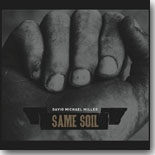 David Michael Miller’s last album, 2014’s
Poisons
Sipped, was highly acclaimed by fans and critics
alike, and the Buffalo resident was named New Artist
of the Year for 2015 by the Arts Service Initiative
of Western New York and was voted Best Male Blues
Vocalist for the second consecutive year by
Night-Life Magazine. He’s also formed a new band
called Miller and the Other Sinners, which includes
sax man Jason Moynihan (Buddy Guy), keyboardist Jim Ehinger (Bonnie Raitt, Taj Mahal), and drummer
Carlton and guitarist Darick Campbell (The Campbell
Brothers).
David Michael Miller’s last album, 2014’s
Poisons
Sipped, was highly acclaimed by fans and critics
alike, and the Buffalo resident was named New Artist
of the Year for 2015 by the Arts Service Initiative
of Western New York and was voted Best Male Blues
Vocalist for the second consecutive year by
Night-Life Magazine. He’s also formed a new band
called Miller and the Other Sinners, which includes
sax man Jason Moynihan (Buddy Guy), keyboardist Jim Ehinger (Bonnie Raitt, Taj Mahal), and drummer
Carlton and guitarist Darick Campbell (The Campbell
Brothers).
Fans who enjoyed Miller’s blend of blues, R&B,
gospel, and soul on his previous release have
eagerly awaited the singer/guitarist’s latest
release, and they will not be disappointed in the
least by Same Soil (Food For The Soul Records),
which features11 great new songs from Miller
that travel the same musical territory as its
predecessor and pays tribute to the artists who
influenced his music, such as Muddy Waters, Jimmy
Reed, and Bo Diddley.
Memorable songs abound on
Same Soil. “Doing Me In,
Doing Me Wrong” borrows and updates the main riff
from Waters’ “Mannish Boy,” and “Friend of Mine” is
a slow but sweet blues ballad and one of Miller’s
best vocals on the album, which is really saying
something. “Just Ride” puts a jazz spin on the
blues, and I challenge to sit through the
gospel-flavored rave-up “Got Them Blues” without
moving something. “Needle to the Wheel” is a nice
acoustic ballad, and I really like the easy
Reed-like shuffle of “Too Early in the Morning.”
Based on the evidence presented by
Same Soil and its
predecessor, the reasons why most blues fans aren’t
singing the praises of David Michael Miller are a
mystery. His soulfully intense vocals are second to
none, his songwriting is equally effective, and he’s
a standout guitarist. Hopefully, this excellent 'from
start to finish' release will go a long way toward
getting Miller the attention he deserves.
---
Graham Clarke
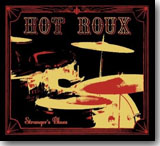 The band Hot Roux specializes in blues rock with a
southern flair that places a heavy emphasis on the
Gulf Coast brand from Louisiana and Texas. Led by
drummer/vocalist Jerry McWorter, the band includes
bassist Brent Harding and guitarists Ed Berghoff and
Tommy Harkenrider, plus several guest musicians,
including Mannish Boys guitarist Franck Goldwasser,
bass players Sam Bolle and Steve Nelson, guitarist
Pat McClure, harmonica player Jacob Huffman, and sax
man Bill Flores.
The band Hot Roux specializes in blues rock with a
southern flair that places a heavy emphasis on the
Gulf Coast brand from Louisiana and Texas. Led by
drummer/vocalist Jerry McWorter, the band includes
bassist Brent Harding and guitarists Ed Berghoff and
Tommy Harkenrider, plus several guest musicians,
including Mannish Boys guitarist Franck Goldwasser,
bass players Sam Bolle and Steve Nelson, guitarist
Pat McClure, harmonica player Jacob Huffman, and sax
man Bill Flores.
Hot Roux’s latest release,
Stranger’s Blues (Hi Hat
Records), features ten original songs that touch on
swamp rock and blues and traditional blues and rock
& roll. McWorter produced the disc and it has the
feel of an old school recording with some splendid
instrumental work and a decidedly retro ambiance. He
also penned all of the tunes here and they’re a
varied and diverse set. “Broken Again,” the opening
track has a country feel with Berghoff’s guitar, and
the title track almost makes you feel the Louisiana
humidity behind Goldwasser’s shimmering guitar work.
“Woman Where You Been” is a hard rocking blues with
Harkenrider on guitar, and “Seven Lonely Nights” is
a Jimmy Reed-styled shuffle with some stinging leads
from Goldwasser. “Big Mama’s” borrows an old
familiar funky Excello rhythm and tells the story of
a small package of dynamite, and “Tick Tock” gently
swings with Flores’ sax providing a backdrop. “Anna
Lea” has an almost pop-like melody, but
Hackenrider’s taut lead guitar places it firmly
within the blues spectrum.
The slinky “Red Pepper Baby” is a funky rhumba-styled
number, and “Can’t Get You Off My Mind” ventures
toward country territory. The closing tune is a
revisiting of “Seven Lonely Nights,” called “Another
Seven Lonely Nights,” which is the same song but
taken in more of a New Orleans direction.
It would have been nice to have a couple more songs
on Stranger’s Blues, the set clocks in at
35 minutes, but on a positive note, it does
leave listeners wanting to hear more……the sign of a
great disc. Hopefully, Hot Roux will be persuaded to
give us more in the near future.
---
Graham Clarke
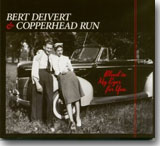 I really liked Bert Deivert’s brand of blues when I
heard his last release, 2011’s Kid Man Blues. He
plays mandolin and guitar, and his mandolin playing
really gives his songs an interesting twist,
especially his interpretations of classic older
blues songs. That being said, I was delighted to see
and hear Devert’s latest release, Blood In My Eyes
For You (Rootsy), which was recorded with the
Swedish band Copperhead Run (Fredrik Lindholm –
drums, percussion, Janne Zander – guitars, Per-Arne
Pettersson – bass, percussion), and continues
Deivert’s approach with ten covers of traditional
blues and two original compositions from Deivert.
I really liked Bert Deivert’s brand of blues when I
heard his last release, 2011’s Kid Man Blues. He
plays mandolin and guitar, and his mandolin playing
really gives his songs an interesting twist,
especially his interpretations of classic older
blues songs. That being said, I was delighted to see
and hear Devert’s latest release, Blood In My Eyes
For You (Rootsy), which was recorded with the
Swedish band Copperhead Run (Fredrik Lindholm –
drums, percussion, Janne Zander – guitars, Per-Arne
Pettersson – bass, percussion), and continues
Deivert’s approach with ten covers of traditional
blues and two original compositions from Deivert.
Most of the cover tunes date back to the pre-war
era, featuring familiar tunes from Big Joe Williams
(“Baby Please Don’t Go”), Son House (“Death
Letter”), the title track from the Mississippi
Sheiks, and four tunes from Sleepy John Estes
(“Mailman Blues,” “Special Agent,” “Drop Down Mama,”
and “Milkcow Blues”). Deivert also covers more
recent fare from blues mandolin pioneer Yank Rachell
(“My Baby’s Gone”), R.L. Burnside (“Poor Black
Mattie”), and Paul “Wine” Jones (“Rob and Steal”).
Though the songs come from the earlier days of the
blues, Deivert’s mandolin and the work of the band,
which is in a decidedly modern vein gives these
songs a new and highly original sound. In some
cases, you will think you’re listening to new songs.
Deivert’s originals, “Black Nanny” and “Cuckoo
Crowed,” fit seamlessly with the classic tunes both
lyrically and musically.
Hopefully, Deivert’s efforts, as well as others like
Ry Cooder, David Grisman, and Steve James, to bring
the blues mandolin to center stage will be
successful, and allow us the opportunity to hear
even more of this unique approach to the blues. In
the meantime, Blood In My Eyes For You is a great
place to hear what you’re missing.
---
Graham Clarke
 The Peterson Brothers, 19 year old Glenn Jr. and 16
year old Alex, started wowing Texas blues fans
several years before they came to the attention of
Michael Freeman. Freeman produced Pinetop Perkins
and Willie “Big Eyes” Smith’s Grammy winner, Joined
at the Hip, and was attending a CD release/97th
birthday party for Perkins in July, 2010 and saw
the young brothers, then 14 and 11, give a rousing
performance that left many mouths wide open in
amazement. The duo has since played multiple U.S.
festivals and opened for B.B. King, Willie Nelson,
Hubert Sumlin, Jimmie Vaughan, Marcia Ball, and
others.
The Peterson Brothers, 19 year old Glenn Jr. and 16
year old Alex, started wowing Texas blues fans
several years before they came to the attention of
Michael Freeman. Freeman produced Pinetop Perkins
and Willie “Big Eyes” Smith’s Grammy winner, Joined
at the Hip, and was attending a CD release/97th
birthday party for Perkins in July, 2010 and saw
the young brothers, then 14 and 11, give a rousing
performance that left many mouths wide open in
amazement. The duo has since played multiple U.S.
festivals and opened for B.B. King, Willie Nelson,
Hubert Sumlin, Jimmie Vaughan, Marcia Ball, and
others.
Freeman signed the brothers to his Blue Point record
label, which recently released their self-titled
debut recording. Backed by Brady Blade on drums and
James Pace on keyboards, the Petersons present
11 tracks, five original tunes by the brothers
and six covers. Wisely, Freeman didn’t rush the
youngsters to the studio immediately, opting to have
them work over several years, honing their craft
with performances, developing songwriting, recording
demos to check their progress, learning to work in a
studio environment, etc. All of this preparation
shows from the opening notes.
The covers are well-chosen and show a variety of
interesting influences……songs associated with Albert
King (“You’re My Woman”), Albert Collins (“If You
Love Me Like You Say”), Bernard Allison (a funky
take on “I Wouldn’t Treat A Dog (The Way You Treated
Me)”), Tampa Red (a rocking remake of “Don’t You Lie
To Me”), and Earl King (“Come On”). The Petersons
put a fresh coat of paint on these standards, thanks
to some creative new arrangements and impressive,
energetic performances.
The original tunes are pretty strong, too, given the
relative youth of the composers. “Hey Baby” swings
relentlessly, “Tell Me Everything” is a loose-limbed
shuffle, and “I Gotta Go” is presented in two
forms…..a shuffle version and a bonus swing version
at the end of the disc. “Feelin’ Like Home” is a
jazzy instrumental with some nice guitar from Glenn
Jr.
Glenn Jr. is a very talented guitarist. His solos
are diverse and creative, and he never
overplays, always leaving room for more. Vocally, he
has a smooth, confident delivery and though he’s
very good now, he will also get better with time.
Alex is a rock solid rhythm man on bass, and he even
breaks out the violin and takes center stage on the
beautiful version of “Amazing Grace” that closes out
the disc.
I was really impressed with the Peterson Brothers’
debut effort. It’s one of the best debut recordings
I’ve heard in a while. Based on this superlative
release, the future of the blues couldn’t be in
better hands.
---
Graham Clarke
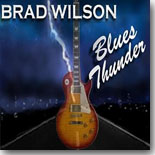 California blues rocker
Brad Wilson returns with
Blues Thunder (Cali Bee Music), a disc that proves
his talents go well beyond that particular genre. A
guitarist of impressive range and depth, and a
great, soulful vocalist to boot, Wilson penned all
12 tracks on this new release, and he’s backed
by Brian Beal (bass), Amrik Sandhu (drums), Kirk
Nelson (keyboards), and Tumbleweed Mooney
(harmonica).
California blues rocker
Brad Wilson returns with
Blues Thunder (Cali Bee Music), a disc that proves
his talents go well beyond that particular genre. A
guitarist of impressive range and depth, and a
great, soulful vocalist to boot, Wilson penned all
12 tracks on this new release, and he’s backed
by Brian Beal (bass), Amrik Sandhu (drums), Kirk
Nelson (keyboards), and Tumbleweed Mooney
(harmonica).
The opening track, “Is It Any Wonder,” starts the
disc off on an almost quiet, reflective note, Wilson
turns in a nuanced vocal and some crisp guitar
work,” and “Blue Shadows” is almost jazz-like in its
approach. “Change It Up” is a rocker with a slight
Latin tempo. The shuffle “Step By Step” has some
tasty harmonica from Mooney and fierce fretwork from
Wilson. The title track is a pure hard-driving blues
rocker with more standout string-shredding guitar.
Next up is the Diddley-esque “Let’s Go Barefootin’
It,” a fun track teaming Wilson with Mooney’s
harmonica, followed by “My Faith Has Been Broken,” a
classic rock-styled ballad. There’s also “Cool
Runnin’,” a pop-flavored mid-tempo groover, and the
acoustic rambler, “Home,” that slowly builds in
intensity. “Black Coffee At Sunrise” finds Wilson in
jump blues mode with highly satisfying results. The
album ends strongly with the jazzy blues of “Sugar
Sweet,” which has a funky rhythm and some hot
guitar, and the powerhouse rocker, “Never Again.”
Based on what’s heard on
Blues Thunder, it sounds
like Brad Wilson is branching out from the scorching
blues rock of his previous release (2013’s Hands On
The Wheel) and showing his listeners that he’s
capable of much more. There’s a lot of great music
here that will appeal to fans of multiple genres.
---
Graham Clarke
 The Betty Fox Band made the 2015 IBC finals, which
was added to an already impressive résumé The band
is considered one of the best on the Florida scene,
garnering attention at multiple music festivals
over the past few years. Lead singer Fox comes from
a musical family steeped in southern country gospel.
She has since branched out into the blues, but her
fiery and passionate style continues to show her
gospel roots and her love for soul music. She’s
backed by a superlative set of musicians, including
Kid Royal (guitar), Barry Williams (bass), Sam
Farmer (drums), and Shawn Brown (keyboards).
The Betty Fox Band made the 2015 IBC finals, which
was added to an already impressive résumé The band
is considered one of the best on the Florida scene,
garnering attention at multiple music festivals
over the past few years. Lead singer Fox comes from
a musical family steeped in southern country gospel.
She has since branched out into the blues, but her
fiery and passionate style continues to show her
gospel roots and her love for soul music. She’s
backed by a superlative set of musicians, including
Kid Royal (guitar), Barry Williams (bass), Sam
Farmer (drums), and Shawn Brown (keyboards).
The band’s second release,
Slow Burn places Fox’s
powerhouse vocals front and center. She wrote or
co-wrote 11 of the 13 tracks and they’re
standouts, including “Sweet Memories,” “Solid
Ground,” “Our Love,” and the aptly-titled title
track. However, the real slow burner and
centerpiece of the set is Fox’s amazing cover of
Otis Redding’s “Remember Me,” which is approximately
seven and a half minutes of Southern Soul Heaven.
Fox also ventures into jazz territory on songs like
“Think About It,” “Please Come Home,” and Who’s Holdin’,” and her nimble vocals are more than up to
the task on these tunes.
I like the gentle, loping rhythm the band takes on
“Take A Walk With Me,” complementing Fox’s playful
vocal. The rhythm section does an exceptional job
and Royal’s guitar work is spot-on throughout the
disc, especially on “Baby, Please,” another slow
burner that Fox just knocks out of the park.
The
closer is a splendid reading of Willie Nelson’s
“Angel Flying Too Close to the Ground,” featuring
Fox accompanying herself on acoustic guitar.
Slow Burn is an excellent release from start to
finish. Blues fans should plan on hearing much more
from the Betty Fox Band for a long time to come.
---
Graham Clarke
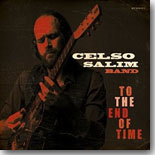 Celso Salim is considered one of Brazil’s leading
bluesmen, with four well-received albums previously
to his credit. In addition to his solo career, he’s
also a music producer and has played for two other
bands, Ari Borger’s Quartet and Sergio Duarte’s
Blues Band. He counts Muddy Waters, Blind Willie
McTell, Freddie King, B.B. King, and Johnny Winter
as influential blues guitarists, but he also lists
Classic and Southern Rock, Country, Jazz, and Soul
as influences on his music.
Celso Salim is considered one of Brazil’s leading
bluesmen, with four well-received albums previously
to his credit. In addition to his solo career, he’s
also a music producer and has played for two other
bands, Ari Borger’s Quartet and Sergio Duarte’s
Blues Band. He counts Muddy Waters, Blind Willie
McTell, Freddie King, B.B. King, and Johnny Winter
as influential blues guitarists, but he also lists
Classic and Southern Rock, Country, Jazz, and Soul
as influences on his music.
Salim’s fifth solo album,
To The End of Time (GRV
Discos), was recorded in Såo Paulo and produced by
longtime collaborator Rafael Cury. He’s backed by
another longtime associate, bassist Rodrigo
Mantovani, and drummer Jason Sterling, with a number
of special musical guests including Borger
(keyboards), Humberto Zigler (drums), Darryl
Carriere (harmonica), Denilson Martins (sax), and
Sidmar Vieira (trumpet). Bia Marchese and producer
Cury also add vocals on several tracks.
The 11 songs on To The End of Time cover a wide
range of blues styles, from the after-hours groove
of the title track which opens the set. Salim has a
warm, relaxed approach to vocals and he’s backed by
sympathetic harmony vocals and Borger’s slick work
on the keys. The minor-key soul blues “Fool Of Me”
would have been a good fit in Otis Rush’s catalog,
and “Red Light Blues” sounds like an old swamp blues
tune with Carriere’s harmonica and the shuffling
rhythm.
Marchese takes the mic, contributing sweet and
sultry vocals to the jazzy “Leave It To The Moon.”
“Blind Man With A Gun” comes in on the country side
of blues with dobro and piano, as does “Old Blues
Goodbye.” “Devil In You” is a marvelous slow blues,
complete with horns and some sweet guitar work from
Salim. The final original tune is the urban blues
closer, “Rest My Bones.” Salim also offers three
covers: the classic “It’s Just Too Bad,” from
Barbecue Bob, a swinging take on Sleepy John Estes’
“Liquor Store Blues,” and Elmore James’ “Talk To Me
Baby,” with spirited vocals from Cury.
If there was any doubt beforehand, Celso Salim
proves that he’s a guitarist of the highest order in
a variety of styles on To The End of Time. File this
outstanding album under “Blues Well Done.”
---
Graham Clarke
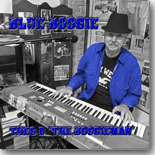 There are a lot of places that blues fans need to
visit when they travel to Clarksdale, Mississippi, but a
must-stop for any blues or rock & roll fan is the
Rock & Blues Museum, which is located on 2nd Street.
For a donation of $5, you gain access to an
incredible amount of blues, soul, and rock & roll
memorabilia, ranging from old record players, juke
boxes, records of all kinds, posters, pictures,
sheet music, costumes, and just about anything else
music-related that you can imagine, from the blues
of the Delta to the rock & roll of the ’50s to the
British Invasion to the soul & R&B of Stax and
Motown. It’s an amazingly extensive set of
memorabilia, and it’s all the property of the
museum’s founder, Theo Dasbach.
There are a lot of places that blues fans need to
visit when they travel to Clarksdale, Mississippi, but a
must-stop for any blues or rock & roll fan is the
Rock & Blues Museum, which is located on 2nd Street.
For a donation of $5, you gain access to an
incredible amount of blues, soul, and rock & roll
memorabilia, ranging from old record players, juke
boxes, records of all kinds, posters, pictures,
sheet music, costumes, and just about anything else
music-related that you can imagine, from the blues
of the Delta to the rock & roll of the ’50s to the
British Invasion to the soul & R&B of Stax and
Motown. It’s an amazingly extensive set of
memorabilia, and it’s all the property of the
museum’s founder, Theo Dasbach.
Dasbach has been a fan of the blues since he heard
his first blues 78 at his grandfather’s house when
he was eight years old. He’s been collecting these items
for over 50 years, beginning in his native country,
The Netherlands, which was the original location of
the Rock & Blues Museum. In 2005, Dasbach moved to
the Delta, splitting time between Clarksdale and
Memphis. He also was bitten by the blues bug and
began playing piano again after a long break.
Encouraged by the one and only James “Super Chikan”
Johnson, he began performing locally as Theo D The
Boogieman.
Dasbach has released a pair of his own CDs, his most
recent being Blue Boogie. Backed by Daddy Rich’s
harmonica and Robert “Little Bobby” Houle, who plays
guitar, drums, and bass, Dasbach plays keyboards and
sings eleven original songs. Super Chikan once said
of Dasbach, “he’s got the blues so bad, he can
hardly play it, but he’ll get it.” That’s not really
the case though, Dasbach CAN play the blues. Nothing
fancy, but it makes your toe tap and your fingers
snap.
Dasbach’s songs touch on familiar blues themes in a
different way. “It Is Funny” is about the mistakes
we all make, “A Good Man Is Hard To Find” is a song
dedicated to women. He also touches on topical
themes, as on “Binder Full of Blues,” about the most
recent election, and “God Bless The USA,” which
speaks out against violence. Other highlights
include “Come On Down To Clarksdale,” “Brownsville
Boogie,” and “Blues For Mr. Tater,” a dedication to
the late Clarksdale blues icon.
The blues world needs more figures like Theo Dasbach,
whether he’s busy promoting the blues through his
museum or enthusiastically playing his version of
blues and rock & roll. I strongly encourage you to
visit the Rock & Blues Museum when you’re in
Clarksdale, and while you’re there, you’d do well to
pick up a copy of the Boogieman’s Blue Boogie.
---
Graham Clarke
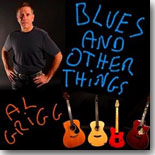 Al Grigg has been involved in music for nearly all
of his life, beginning with his tenure with The
Flying Dogs of Jupiter, one of the first indie
bands, then playing with the Atlanta-based group
Juke Box Gold during the ’90s and later playing in
various groups in Asia, Australia, and Europe for a
ten year period beginning in 2000. Since returning
to the U.S. in 2010, he’s worked as a solo act and
also with the New York / New Jersey band The Fine Line. He’s also a
producer/engineer at his own Jovian Records and Red
Spot Recording Studio.
Al Grigg has been involved in music for nearly all
of his life, beginning with his tenure with The
Flying Dogs of Jupiter, one of the first indie
bands, then playing with the Atlanta-based group
Juke Box Gold during the ’90s and later playing in
various groups in Asia, Australia, and Europe for a
ten year period beginning in 2000. Since returning
to the U.S. in 2010, he’s worked as a solo act and
also with the New York / New Jersey band The Fine Line. He’s also a
producer/engineer at his own Jovian Records and Red
Spot Recording Studio.
Grigg’s latest solo release,
Blues and Other Things
(Jovian Records), is appropriately titled. The seven
songs encompass blues (“Your Meal Ticket (I Ain’t
Gonna Be),” “Dead End Boogie”) and R&B (the smooth
“It Just Don’t Have To Be That Way”) as well as
classic rock (“All The Way Home,” “I’m Gonna Jump
Right into the Fire,” “In Cecelia’s Garden,” and the
boisterous closer, “American Dream.”).
Grigg wrote all the songs and plays guitar and drums
on all tracks. His songs have catchy rhythms and
lyrics, and he’s a first-rate guitarist in a variety
of styles. He’s backed by Greta Tristram on
harmonica and Frank Kaiser on rhythm guitar. The
disc doesn’t overstay its welcome, clocking in at
just less than 30 minutes, but it's 30
minutes well spent with some great tunes and
fretwork that will leave you wanting to hear more
from Al Grigg.
---
Graham Clarke
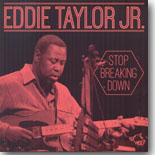 Austria's
Wolf Records has for many years been a tireless
documentarian of Chicago and Country blues,
releasing hundreds of albums in their 30+ year
history, and for that they should be commended. But
the risk of trying to release music in such great
volume is that you're occasionally going to put out
something that perhaps isn't quite up to snuff.
That's the case with the new Eddie Taylor Jr.
release, Stop Breaking Down. It's not that
Taylor Jr. and his bandmates aren't capable
musicians, but rather that the recordings here
generally lack energy and originality, and are just
too pristine sounding.
Austria's
Wolf Records has for many years been a tireless
documentarian of Chicago and Country blues,
releasing hundreds of albums in their 30+ year
history, and for that they should be commended. But
the risk of trying to release music in such great
volume is that you're occasionally going to put out
something that perhaps isn't quite up to snuff.
That's the case with the new Eddie Taylor Jr.
release, Stop Breaking Down. It's not that
Taylor Jr. and his bandmates aren't capable
musicians, but rather that the recordings here
generally lack energy and originality, and are just
too pristine sounding.
The first ten cuts on
Stop Breaking Down were recorded and mixed in
Chicago during the summer of 2014, and consist
mostly of well-known blues classics like Slim
Harpo's "I'm a King Bee," Jimmy Reed's "Baby What
You Want Me To Do," Elmore James' "The Sky Is
Crying," Robert Johnson's "32-20 Blues," Brook
Benton's "Kiddio" and a couple of Taylor originals,
"Baby Please Come Home" and "You Gotta Pay The
Price."
If the listener
hasn't dozed off or given up on the album through
the first nine songs, there's a reward at the end
when Harmonica Hinds gives the band a big jolt of
energy on the traditional number "Low Down Dirty
Shame." The final two cuts, Tommy McClennan's
"Whiskey Headed Woman" and Robert Johnson's Stop
Breaking Down," recorded live in Vienna, Austria in
2012 with just the duo of Taylor Jr. and Hinds, are
also top-notch blues tunes.
The final three
numbers on Stop Breaking Down show what could
have been had Hinds been brought in earlier in the
process. Instead, this release would have been
better as an EP instead of a full-length album.
Better yet, go looking for Hinds' own release on
Wolf, I'd Give You Anything If I Could, with
Taylor Jr. and Kenny Smith backing him.
---
Bill Mitchell
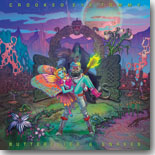 Butterflies
& Snakes is the self-released debut disc from
Southern California band Crooked Eye Tommy,
showcasing 11 original numbers penned by
either bandleader Tommy Marsh or brother Paddy
Marsh. The band, a contestant in the 2014
International Blues Challenge, describes their style
of music as "deep seeded blues and smokey southern
rock," and that's a pretty apt description.
Butterflies
& Snakes is the self-released debut disc from
Southern California band Crooked Eye Tommy,
showcasing 11 original numbers penned by
either bandleader Tommy Marsh or brother Paddy
Marsh. The band, a contestant in the 2014
International Blues Challenge, describes their style
of music as "deep seeded blues and smokey southern
rock," and that's a pretty apt description.
The Marsh brothers
are both fine guitar players, as heard when Tommy
plays the slide on the opening, somewhat
autobiographical number, "Crooked Eye Tommy."
Brother Paddy steps up to the mic to handle lead
vocals on one of his own tunes, showing good range and a touch of soulfulness on the
snaky blues "Come On In." With a little more grit
and power to his pipes, it's not hard to imagine
him rivaling better-known soulful blues singers
like Darrell Nulisch and Tad Robinson.
Paddy's composition
"I Stole The Blues" is a solid blues number with a
couple of good guitar solos from one or both of the
Marsh brothers and fine sax playing from Jimmy
Calire. The funkier "Time Will Tell" features strong
vocals and one of the strongest guitar solos on the
album; it's this number that gives the album it's
name when Marsh sings "... women are made of
butterflies, butterflies and snakes ..."
Calire returns with
strong sax work on the mid-tempo shuffle "Somebody's
Got To Pay," and then shows off his versatility with
a hot piano solo on the rockin' blues "Mad And
Disgusted." I wasn't familiar with Calire's talents
before listening to this CD but I'm impressed by the
man, to say the least.
Butterflies &
Snakes closes with "Southern Heart," given a
Country & Western feel with the addition of Jesse
Siebenberg on steel guitar; I could imagine hearing
a more bluesy Merle Haggard singing this one. While
this song veers away from the blues of the previous
10 cuts, it's not out of place here.
This album caught me
by surprise --- higher quality than I expected a
self-released album to be. You can find out how to
get your own copy of Butterflies & Snakes and
learn more about the band at
www.crookedeyetommy.com.
---
Bill Mitchell
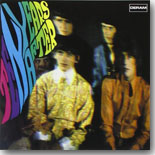 This trilogy of digitally re-mastered double CDs
from 1967, 1968 and 1969 re-release by Deram ---
Ten Years After, Undead, and
Stonedhenge ---charts the rise of Ten
Years After from a virtually unknown band to a supergroup
on both sides of the pond culminating in the
unforgettable performance at Woodstock.
This trilogy of digitally re-mastered double CDs
from 1967, 1968 and 1969 re-release by Deram ---
Ten Years After, Undead, and
Stonedhenge ---charts the rise of Ten
Years After from a virtually unknown band to a supergroup
on both sides of the pond culminating in the
unforgettable performance at Woodstock.
In many
respects the first, eponymous album is the best
because its freshness and authenticity reflect the
British blues-rock explosion of that era. What
stands out is the emergence of founding member Alvin
Lee as an all round musical genius. His vocal range
is immense through songs of various genres whilst
his trademark guitar tricks, licks and riffs are all
there at this early stage.
Alvin plays superb harp
on "Love Until I Die" and his carefully crafted lyrics
are evident on tracks like "Feel It For Me" and "Don’t
Want You Woman." However, it is the influence of
Lee’s father Sam who loved American blues and
introduced his son personally to Big Bill Broonzy
which is manifest on "Spoonful" and "Help Me."
Additional to the original LP is the 1968 single
release of "Portable People" and its B-side, "The
Sounds," which was listed in Decca’s ‘Pop Toppers of
the Week‘ alongside the New Faces and Ted Heath.
Presumably this was aimed at commercial success
which mercifully did not materialise.
By the time
Undead was released, Ten Years After were touring
regularly in America and needed a follow-up album,
hence this live recording at West Hampstead’s Klooks
Kleek venue. This combination of blues and jazz jams
culminating in what was to become the band’s
national anthem, "I’m Going Home," cemented Lee’s
reputation as the fastest guitarist in the west with
fleet-fingered fret work of a velocity rarely
witnessed previously.
The bonus tracks on this
extended version such as "Hear Me Calling" and "Woman
Trouble" also demonstrate a more intricate, tasteful
guitar style.
Stonedhenge was the second studio
album and much more experimental and psychedelic,
representing the trends in progressive contemporary
rock whilst also being innovative. "Going To Try" sets
this scene with various effects added to
improvisations such as "No Title," "Skoobly-Oobly-Doobob" and the finale
"Speed Kills," the
ultimate train song.
The producer of all three
albums, Mike Vernon, encouraged what he called
‘instrumental vignettes’ as Alvin, Leo Lyons, Ric
Lee and Chic Churchill took turns to solo. This
worked well for the lead and bass guitars but less
so for the drums and organ. The second disc adds
"Boogie On" and "I Ain’t Seen No Whisky" to the original
mix. It is a pity that the sound quality of much of
the bonus material on all three albums is so poor
and that some tracks are repeated several times
unnecessarily.
Collectively, these three re-releases plus bonus
tracks are important musically and historically
because they represent the genesis of a significant
late '60s band and the emergence of a guitar god
who received critical acclaim in the music press of
that time. By 1972, Alvin Lee had also embarked on a
solo career with a variety of exceptional musicians,
whilst occasionally performing with Ten Years After
until the 1990s.
For nearly a decade, from 2003, Joe
Gooch had replaced Alvin, and Ten Years After Now
became something of a tribute band in the opinion of
a significant number of fans. Gooch and Leo formed
their own band in 2014 called Hundred Seventy Split,
which has enabled Joe to flourish musically. Ric and
Chic are part of the new Ten Years After, and
although the name remains the same it is essentially
the distinctive sound of the Marcus Bonfanti Band
plus Alvin’s classic compositions. Marcus is a
highly individual bluesman in his own right and
features prominently in the Ronnie Scott’s Blues
Explosion.
Alvin Lee died in 2013 after half a
century at the top of his profession having been
voted the best ever exponent of a Gibson guitar
ahead of such luminaries as BB King. Fortunately a
wealth of music recorded in Alvin's privately owned
Space Studio is waiting to see the light of day,
allowing the Lee family to enhance his legacy in
years to come through the judicious release of high
quality footage from his musical career.
---
Dave Scott